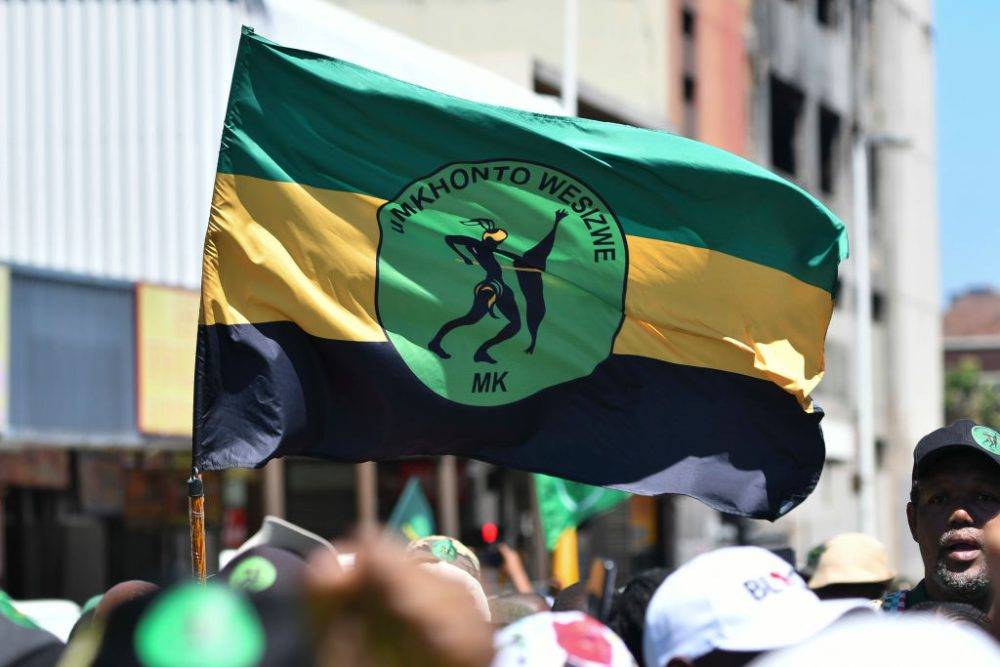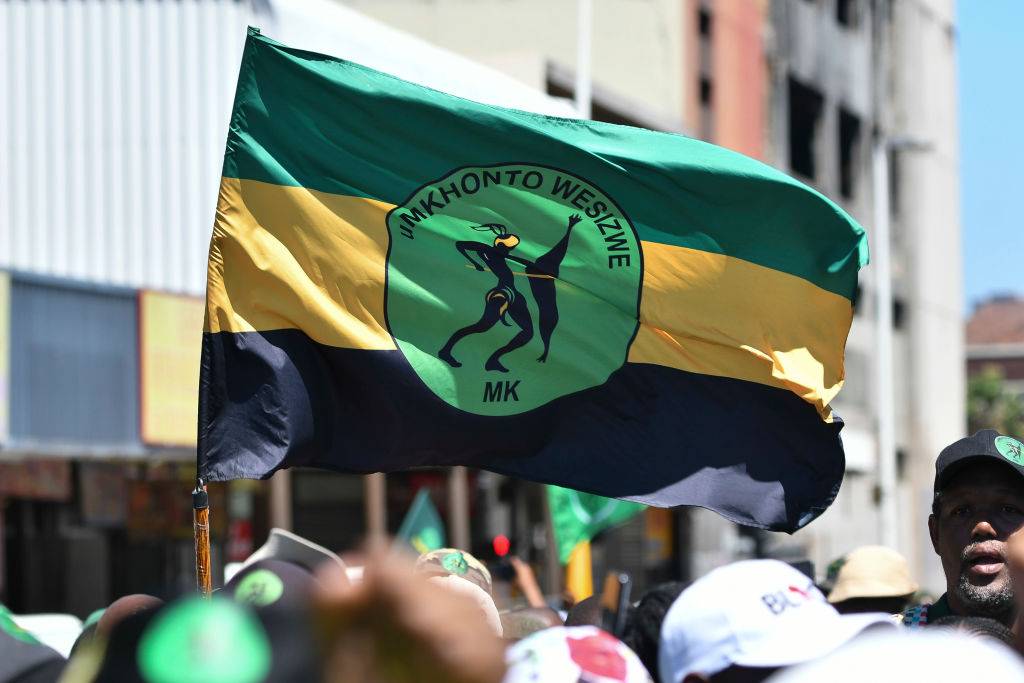
The MK Party applied to register the use of the disputed symbol in July last year and the application was published in the Government Gazette. (Photo: Darren Stewart/Gallo Images via Getty Images)
CLawyers for the ANC told the Durban High Court on Thursday it was entitled to stop the “ongoing unlawful practice” of Jacob Zuma's Umkhonto weSizwe (MK) party using the logo and name of the party's dissolved armed wing.
“So long as the mark is being used there is harm,” lawyer Gavin Marriott said in an application for leave to appeal against a court decision in April that rejected an application for an emergency injunction to ban the MK party from using its iconic logo of a spear-holding warrior.
Marriott was refuting claims by MK Party's Dali Mpofu SC that the damage the ANC was allegedly trying to prevent no longer matters because the May elections are in the past.
Mpofu said Marriott had unfairly sought to introduce the Bar Association's arguments because the ANC's submissions in its court application documents focused only on the process leading up to the vote.
“They are dealing with the present, before May 29, and also the past, but not the future. That is the end of this application,” he argued.
“The issue is not up for debate in these papers. The elections are already over and people are in parliament everywhere.”
In its initial High Court application, filed four months before the election, the ANC had argued urgency on the grounds that time was of the essence to prevent voter confusion.
“Millions of voters will know the name Umkhonto weSizwe. [it] MKP and its logo are synonymous with the history of the ANC and in so doing, they are more likely to vote for MKP while believing they are actually voting for the ANC.”
Using both the name and logo would “mislead” the public into believing there is a link between the ANC and the new party founded by Zuma.
The party argued that “intentionally causing confusion among voters undermines free and fair elections.”
The petition was dismissed by Judge Mahendra Chetty in April.
Marriott told the court on Thursday the ANC was likely to get a different outcome if it appealed, saying he believed the MK party, which is now the country's official opposition, deserved an order banning it from using both its registered name and logo.
“We will be asking for a name and logo change.”
He said it was not correct to say the issue had become moot or that the lawsuit was limited to damage that might result from the election.
“This is a case based on continuing misconduct and we believe it deserves review by the Court of Appeal.”
Mr Chetty asked Mr Marriott to point out a passage in the ANC founding affidavit which indicated the case was about continuing infringement.
Marriott responded: “That is self-evident, because as long as the trademarks continue to be used, the damage will continue. Trademark infringement will not end just because the election is over.”
“This is about the continuing relationship between the MK Party and the ANC and its history.”
He added that Zuma was on record as saying that voting for his party was a vote to “save the ANC from the outside”. The former president was wearing a T-shirt with the logo in question at the time, Marriott said, adding that MK's behaviour would not stop.
Marriott, an expert in intellectual property law, said Chetty's April ruling was, to his knowledge, the first time the High Court had found it had no jurisdiction to adjudicate a trademark infringement dispute and that this alone was an error that would give the ANC leave to appeal.
“Nothing like this has ever happened before, and on that basis alone we would argue there is a good chance that at least another court will differ with you.”
Mr Chetty asked whether this argument was selective, because this particular judgment was made in the context that this was an electoral matter and was within the jurisdiction of the Electoral Tribunal, and the ANC had applied to the Electoral Tribunal at the same time as it was in the High Court.
“Effectively, what you were asking me to do was to split the issue and hold that certain parts were within the jurisdiction of the Electoral Tribunal and on the same document, this court has jurisdiction over the trade side.”
Mr Marriott responded that his case was that Mr Chetty had also erred in that respect.
“With all due respect, our opinions differ greatly,” he said.
“The gist of the judge’s judgment was that because the ANC had raised the trademark issue in its Electoral Tribunal papers, it could no longer bring a trademark infringement claim in the High Court on any basis.
“The fact that the ANC has filed an objection in that forum does not confer jurisdiction on that forum to determine trademark jurisdiction.”
The second point, he said, is that even though the High Court has jurisdiction to hear trademark cases, it is not acceptable for it to take a decision not to exercise its jurisdiction in this case, thinking that the matter should be resolved by the Election Tribunal.
“You cannot deny or refuse to exercise the jurisdiction that you have simply because you think it would be better to have jurisdiction somewhere else. You are required to exercise jurisdiction.”
In his April ruling, Justice Chetty noted that section 20(2)(a) of the Election Commission Act gives the Election Tribunal the power “to hear and determine appeals against any decision of the Commission relating to the interpretation of any law”.
The judge said the provision “puts an immediate end to forum shopping” and concluded that “the ANC has chosen the wrong forum to assert its rights. This court lacks jurisdiction.”
It further held that the ANC had failed to establish a clear right to relief in relation to the use of the name uMkhonto we Sizwe or its logo.
He could not conclude that MK was likely to gain an unfair advantage from the use of a symbol imbued with the ANC's reputation or that voters were likely to conclude that there was a link between MK and the ANC.
This is especially so because the MK party had positioned itself as an alternative to the ANC during the election campaign.
“In my view, there can be no confusion among voters seeing the symbols of the ANC and MKP in the sacred space of a polling station,” Chetty said.
Chetty accused the ANC of creating its own urgency and said it had not offered a convincing explanation for waiting until January to apply to the High Court after the South African Electoral Commission (IEC) in November dismissed the ANC's appeal against the MK party's registration decision.
ANC secretary-general Fikile Mbalula explained that the party structure needed to be consulted, but he said this was not appropriate because the secretary-general position gives him the power to act in the party's interests.
The ANC's case was complicated by the fact that Legacy Projects Ltd had in 2014 acquired exclusive rights to symbols linked to the organisation's militant wing for 10 years.
But last September, two weeks after the IEC registered MK as a political party, the ANC signed a deal with Legacy Project to acquire the rights.
Mpofu argued in court that the ANC could not claim infringement at the time of the actual registration two weeks ago, an argument he repeated on Thursday.
The MK Party applied to register the use of the disputed symbol in July last year, and the application was rejected. Government GazetteThe ANC did not use the 14-day period to lodge an objection, explaining that it only learned of the application later, in August.
Instead, about two weeks after registering MK, the company appealed to the IEC, seeking to overturn the decision on the grounds that it infringed both its name and trademark.
The appeal was dismissed in November.
The ANC then responded by filing simultaneous urgent applications with the Electoral Tribunal and the High Court.
The company argued that it had to approach the High Court as the jurisdiction of the Election Tribunal extends only to election matters whereas only the High Court can grant relief in respect of trademark infringement.
The Electoral Tribunal rejected the ANC's application in March, saying the party had failed to provide grounds for deregistration.
Mpofu said the ruling, handed down just days before the filing of the High Court case, was fatal to the ANC's case.
“So how can you get an order contingent on misappropriation?” he asked.
“Once you lose that, they can't come in front of you and say with a straight face that the use is unauthorized.”

